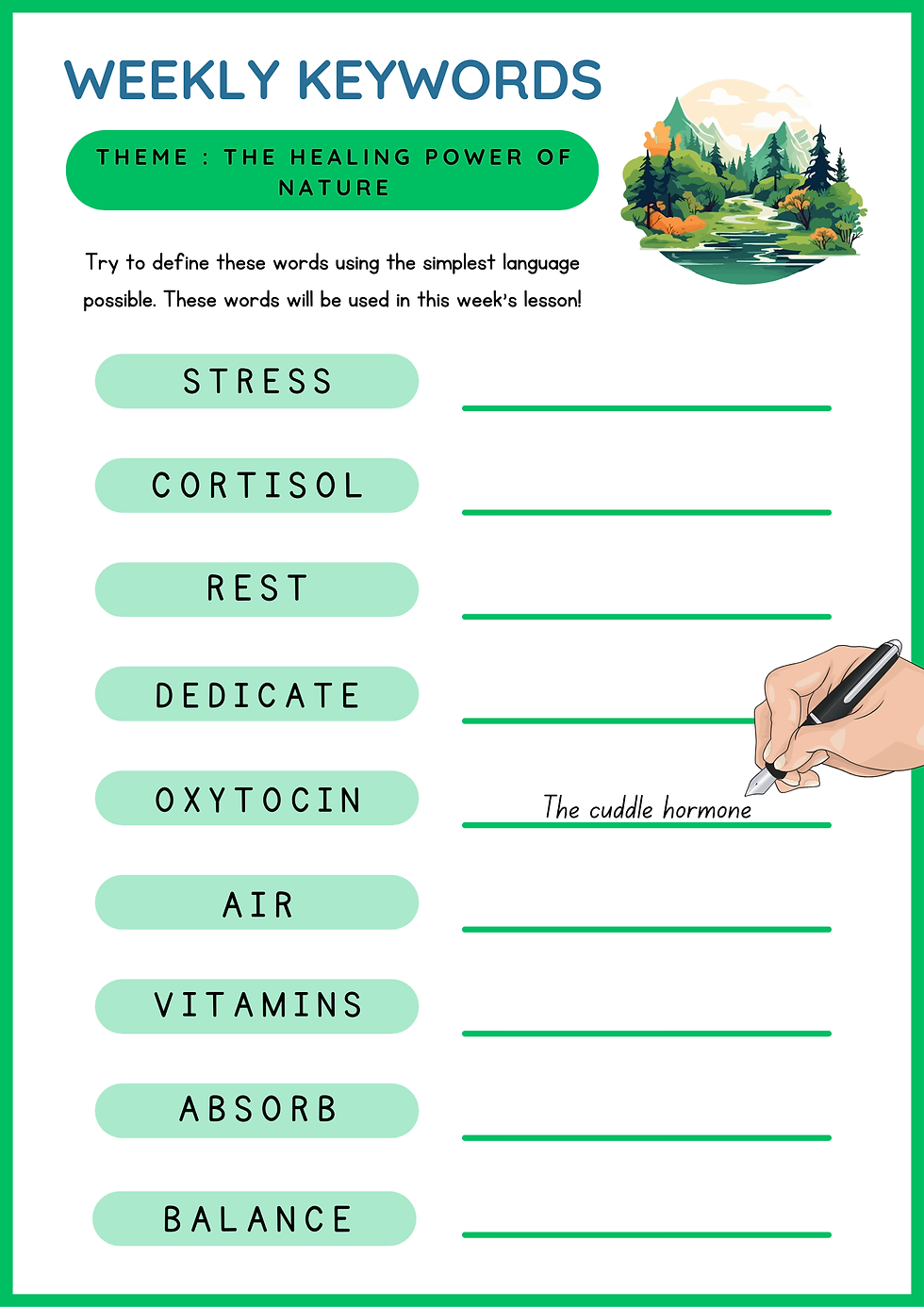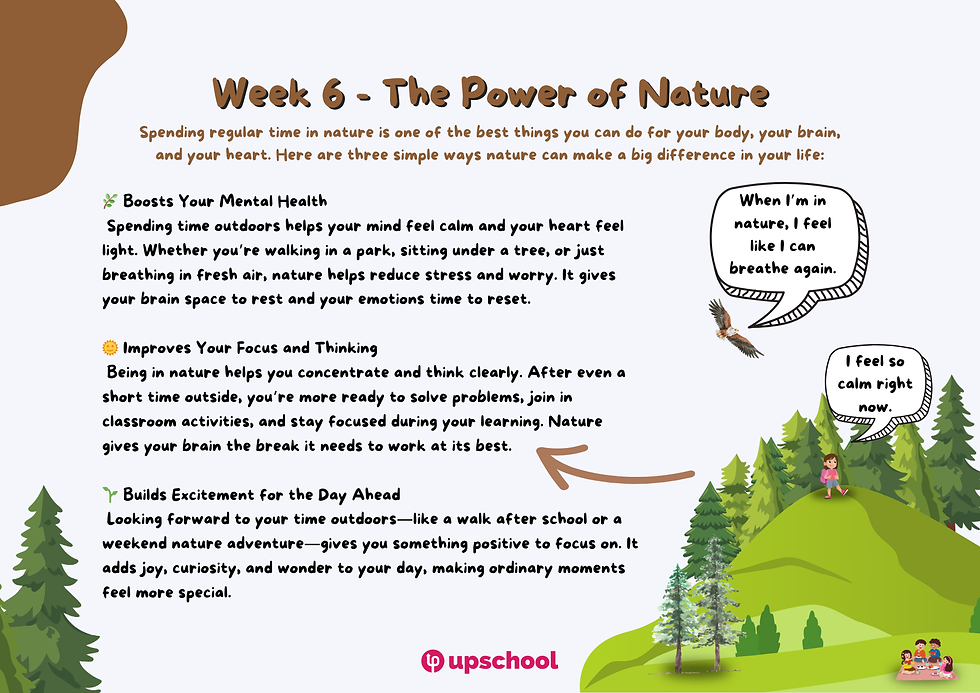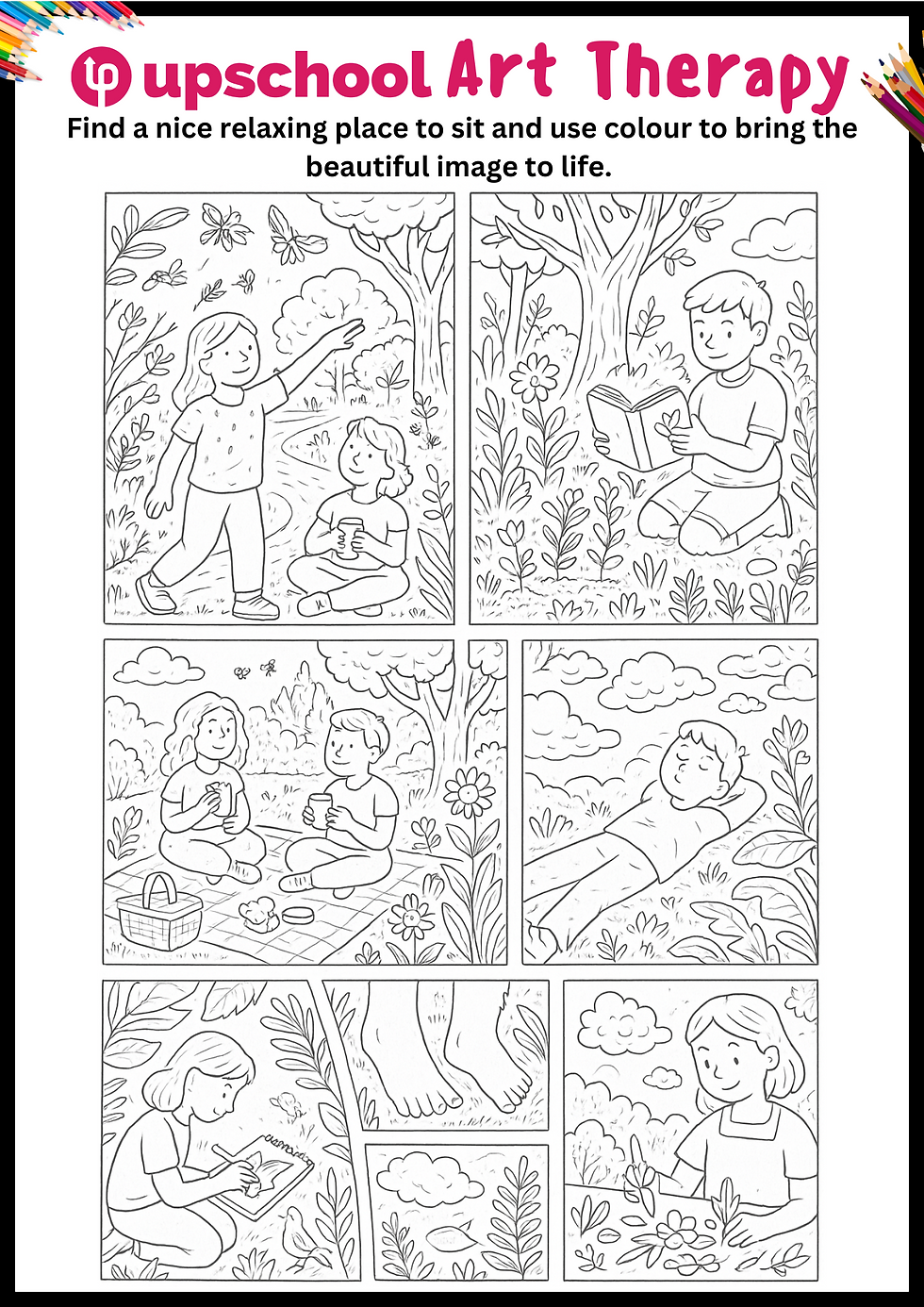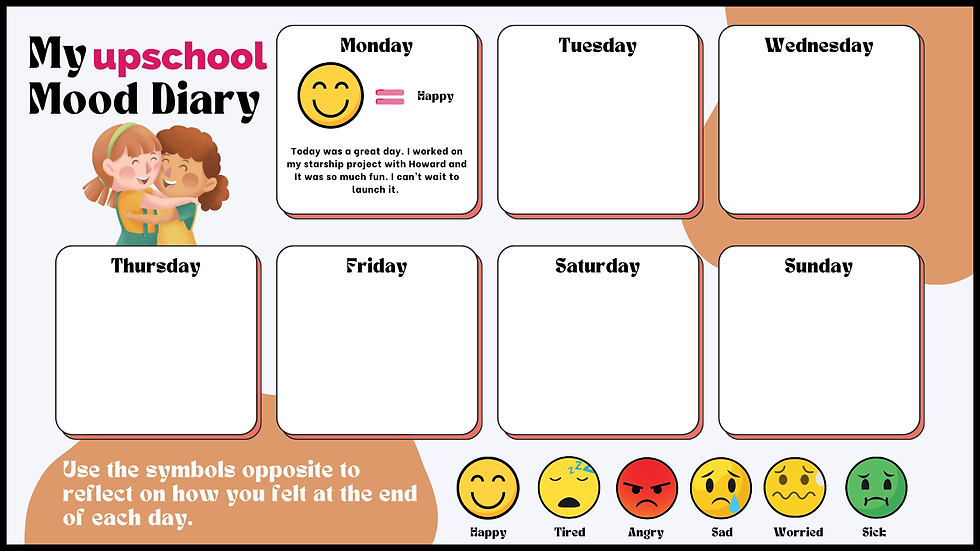Healthy Habits
The Importance of Nature
Introduction – Nature: Where We Belong
In this introductory activity, children are introduced to the link between nature and wellbeing through observation and reflection. The video features real-world examples from Iceland that highlight how outdoor environments contribute to physical and mental health through sun exposure (vitamin D), stress reduction (lower cortisol levels), and improved cognitive function (enhanced focus after time in nature).
Core Skill: Scientific understanding of health behaviours
This week, we’re heading outdoors—and trust us, nature has a lot to teach us! Gavin and Jack filmed this lesson in the middle of Iceland, where waterfalls crash, sunlight sparkles on the rocks, and people spend hours each week outside.
Did you know that the average Icelander spends 7 hours a week in nature? It’s one of the reasons they feel so healthy and happy! Being outside can give your body vitamin D, which helps your bones grow strong and your energy stay high. It can also lower your stress levels by reducing a hormone called cortisol that builds up when we feel worried or overwhelmed.
And guess what else? A quick walk outside can help you concentrate better. If you ever feel stuck while doing homework or writing a story, stepping into nature for just 15 minutes might help the answers come more easily. It’s like magic—but it’s actually science!
This week, your job is simple: spend time outside every day. Notice the trees, the flowers, the sky. Take a moment to pause, breathe, and just be part of the world. Then write down how it made you feel in your Healthy Habits booklet. At the end of the week, you’ll share your ideas with your classmates—and maybe even teach someone else how powerful nature can be.
Click the link to watch this week’s video, where Gavin and Jack share some amazing facts about Iceland and nature.
Important - Download Your Healthy Habits Booklet
This week, students will use a provided template to begin designing their Healthy Habits booklet. Emphasise the importance of staying within the dotted safe zone for printing. This activity blends creative expression with structured reflection, resulting in a keepsake that celebrates their learning journey.
Core Skill: Structured creativity and presentation awareness
Over the next ten weeks, this booklet is going to be all about you—your ideas, your discoveries, and your journey to becoming healthier and happier. Each week, you’ll explore something new, and you’ll add your own writing, drawings, and reflections into the pages. We’ve given you a special template to help you stay organised. Think of it like your guidebook.
You can change the colours, add your own designs, and really make it your own. Just one important thing—make sure everything stays inside the dotted line (called the safe zone). That way, if you decide to print your book or upload it to the Upschool library, none of your work will be cut off. Every day, you’ll come back to your booklet to add something—maybe how you felt after a walk in nature, a new goal you’ve set, or a drawing that shows your progress. Over time, it’ll become a collection of your thoughts, your actions, and your growth.
By the end of the ten weeks, you’ll have a finished book that shows just how far you’ve come. You might even want to print a copy and keep it as a reminder of the healthy habits you’ve built.
Weekly Keywords
In this activity, students receive a task card with foundational vocabulary related to the power of connection. Their challenge is to explain each term in the simplest way possible, helping them build a strong understanding of hydration concepts.
This exercise supports comprehension of how hydration affects the body and mind, laying a foundation for future discussions on maintaining a healthy and hydrated lifestyle. It encourages clear thinking and mastery of essential hydration-related terms.
On the task card provided, you’ll find a list of words related to the power of connection. Your challenge is to explain each word in the simplest way possible.
This activity will help you understand important concepts about how hydration affects your body and mind. It’s a great way to prepare for future discussions on keeping your body hydrated, healthy, and functioning at its best.

Quote of the Week – John Muir
In this activity, students reflect on an inspirational quote by Helen Keller: "Alone, we can do so little; together, we can do so much." Students will write down or illustrate the quote and discuss its meaning, exploring the importance of teamwork, friendship, and human connection in making a difference.
The activity encourages students to recognise the power of working together, fostering empathy, collaboration, and a sense of belonging.
It inspires them to strengthen their relationships and share the message within their community, building a more connected and supportive world.
This week’s quote is all about the magic of nature and how spending time outside can change the way we feel inside.
These words come from John Muir, a famous nature explorer and writer who loved wild places: “In every walk with nature, one receives far more than he seeks.” – John Muir Write this quote into your Healthy Habits booklet, decorate it, or create a drawing to show what it means to you.
Then, take a moment to think about what you’ve received from nature lately. Has it made you feel calm? Happy? Full of ideas? You might want to write about a time you felt peaceful outdoors or tell a friend about your favourite natural place. Think about how a short walk, a breeze, or the sound of birds can make a big difference in how you feel.
Let this quote remind you that nature always has something to give—if you just take the time to walk, look, and listen.

Design Your Information Card – The Power of Nature
In this task, students design an information card showing how time in nature benefits well-being. They’ll include visuals and practical tips, drawing on their learning from the video. Encourage thoughtful design and real-life examples from their own experiences.
Core Skill: Synthesising information through visual and written communication
In this activity, your job is to make an information card about nature—which means showing how spending time outdoors can help your body and mind feel better.
Start by designing a visual that shows someone enjoying nature, like walking in a forest, sitting under a tree, or watching the clouds. Use pictures or drawings that remind you of calm, fresh air, and feeling happy outside. Next, write your own top tips or reasons why being in nature is important.
You can use examples from our video, like how sunlight gives you energy, how nature helps reduce stress, and how walking outdoors can improve your focus and mood. When you've finished, share your card with your class community so everyone can learn why nature is so powerful.
This card will become part of your "Healthy Habits" booklet—a special collection full of great advice to help you and others feel calm, strong, and connected to the world around you.

Design Your Nature Page – 8 Ways to Include Nature in Your Life!
In this activity, students will create a page in their booklet that highlights three simple, practical ways to engage with nature in their daily lives. They’ll begin with your example, then brainstorm and present their own ideas using writing and visuals. This encourages thoughtful exploration of nature’s benefits while building confidence in self-expression.
Core Skill: Applying personal research and creativity to promote wellbeing through nature
In this activity, your task is to create a page in your "Healthy Habits" booklet about 8 ways you can spend more time in nature. You’ll first look at my example, which gives ideas like going for a walk after school, planting something at home, or sitting outside to watch the clouds or listen to birds. Then, using your own ideas and a bit of research, design your own unique page.
Think carefully about how you share your ideas clearly and creatively, using pictures, colour, and easy-to-read writing. Once you’ve finished, your page will be added to your "Healthy Habits" booklet, helping others understand why spending time in nature is great for your health, your happiness, and your sense of calm.

Track Your Mood – Measure Your Stress Each Day!
In this activity, students will track their stress levels daily using a simple task card scale. After spending time in nature, they’ll reflect on any shifts they notice. Encourage them to link outdoor experiences to their emotional state and identify patterns. This supports emotional regulation and builds awareness of how nature can reduce stress.
Core Skill: Self-monitoring and emotional reflection through experiential learning
Now that you understand how spending time in nature can help you feel calmer and healthier, it’s time to explore how it affects your stress levels. This week, you’ll use the task card opposite to track your stress once each day. After a walk outside, sitting in the sun, or simply being near plants or trees, check in with yourself: Do you feel relaxed? Energised? Less worried? Mark how you're feeling using the scale on your card—low stress, medium stress, or high stress—and then write a short reflection about what influenced your mood that day.
Focus on what kind of time you spent in nature and how it made you feel. By the end of the week, you’ll start to notice patterns. Did your stress drop after being outdoors? Did even a few minutes in nature make a difference?
Let’s discover how small actions in nature can make a big impact on how we feel inside.
.png)
Spreading the Word - Weekly Community Challenge
In this activity, students will select actions from a task card to apply their knowledge of hydration in real-world contexts, focusing on helping others stay hydrated. This encourages leadership by empowering students to independently choose and carry out tasks that promote health in their community.
The emphasis on real-world application helps foster a sense of responsibility and initiative, allowing students to learn from their experiences, whether they succeed or not. This approach nurtures independence and reinforces the value of effort in encouraging others to maintain healthy hydration habits.
Choose an action from the task card and use your new knowledge to make the lives of others better by encouraging good hydration habits. It doesn’t matter which action you choose—what matters is that you share your knowledge to help others stay hydrated, healthy, and happy.
You can choose as many actions as you like from the list, such as reminding someone to carry a water bottle, encouraging a friend to drink a glass of water before meals, or setting up a "hydration reminder" challenge. And remember, it’s all about making an effort and having fun, not about getting perfect results!
.png)
Weekly Art Therapy - Nature
This weekly art activity encourages mindfulness and relaxation through colouring. Teachers should introduce it with enthusiasm, promoting a calm, creative atmosphere.
Allow children the freedom to choose where they sit—whether in a quiet classroom corner or even outside—and consider scheduling a designated time each week. Additionally, this activity can be sent home to support mindfulness practices with families.
Encourage children to focus on the process, not the outcome, and enjoy the benefits of creativity and calm.
Each week, we’ll share a fun and relaxing art activity with you. All you need to do is find a quiet spot—maybe in your room, outside under a tree, or wherever you feel calm. Grab your favourite colouring pencils, set up a soft light or a lamp, and if you’d like, play some relaxing music in the background.
Then, take your time to colour in the picture on the next page and let your mind wander. Doing this can help you feel more relaxed and calm. Colouring gives your brain a little break, helps you focus on the moment, and can even make you feel happier. It’s a way to let your imagination flow while taking care of yourself.
Remember, this is your time to unwind. There’s no right or wrong way to colour—just enjoy yourself and have fun with it!

My Weekly Mood Diary
This activity supports children in tracking daily stress levels using a simple symbol-based diary. Teachers should encourage quiet reflection each day and link changes in stress to time spent in nature. This promotes mindfulness, emotional regulation, and self-awareness.
Emphasise that the diary is private to create a safe space for honest reflection.
As you work through each activity this week, take a quiet moment at the end of each day to check in with yourself. How did you feel today? Did spending time in nature help you feel more relaxed? Were there moments you felt stressed? Using the task card provided, choose a symbol that best shows your stress level—low, medium, or high.
Add it to your diary and write a short note about what may have caused that feeling. Was it something you did, something that happened, or maybe just how much time you spent outdoors? By the end of the week, you’ll start to notice patterns. You might see that your stress is lower on days when you spent more time outside. These discoveries are valuable—they help you understand yourself better and show how nature supports your wellbeing.
This diary is just for you. You don’t have to share it with anyone. It’s your own private space to reflect, grow, and feel proud of how you're learning to take care of yourself.

Weekly Quiz: The Power of Nature
This week, you'll be invited to take a quiz all about the power of nature. After rewatching the video, your task is to correctly answer ten questions about how spending time outdoors can help reduce stress, boost your mood, improve focus, and support your health. If you score 80% or more, you’ll earn a special certificate to celebrate your learning—and it will be emailed directly to you. There are 8 certificates to collect in total, so do your best and keep learning. Good luck!
This week, you'll be invited to take a quiz all about the power of nature. After rewatching the video, your task is to correctly answer ten questions about how spending time outdoors can help reduce stress, boost your mood, improve focus, and support your health. If you score 80% or more, you’ll earn a special certificate to celebrate your learning—and it will be emailed directly to you. There are 8 certificates to collect in total, so do your best and keep learning. Good luck!

.png)






















